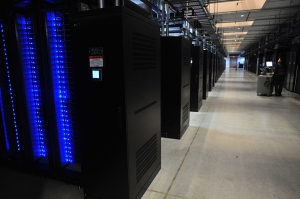Do we shape new media, or does new media shape us?
Frankly, I’m not sure I want to know the answer. One thing I will admit, however, is that social media has changed the game.
It didn’t do it alone. Innovations were developed across the board before and alongside social media that spurred it to its superstardom. But as a recent article in Wired pointed out, Facebook not only branded the like, wall and timeline, it also laid down the foundation for many of its contemporaries’ data centers (Finley, 2014).
Facebook’s data center wasn’t trail blazing, Finley reports (2014). In fact, Zuckerburg’s team of engineers were lopping behind net giants Google and Amazon. And yet, in its usual weasel-like way, Facebook found a way to improve upon what other companies had already done. Rather than lock the database codes away in a tower, the social media company made them open-source. By allowing others free access to their formulas, Facebook facilitated an organic innovation process; others could improve and refine their codes, and Facebook could reap the benefits. The supercomputers Facebook uses in its data centers even pull on outside air to cool their servers, which is better for the environment than keeping the rooms at icy temperatures (Finley, 2014).
All this sharing means that Facebook has dramatically shaped how online organizations retrieve and store mass amounts of data. They’ve had a hand in which popular programs are used to develop websites. The idea that Facebook has changed our social climate isn’t surprising, but the realization of how far it has stretched its enveloping arms is a bit shocking.
In a way, this is all empowering. With open source codes and a little background knowledge, we can learn more about the website. There is potential to suggest changes and outfit Facebook to our lives. Sites like Netflix and Digg based their data centers off of Facebook’s. In a way, this evolution process is going through a distinctly Darwinian phase; the best bits of code get passed on and added to, making our web browsing experience even better.
Those qualities, however, have a dark edge to them. If we don’t take advantage of open sourcing, then we let the creators morph our experiences. This is David Rushkoff’s argument about either programming or being programming in the flesh (or should I say “in the code?”). Facebook takes up a big chunk of many people’s lives already. The more innovations are refined, the harder it could be for us to shed social media.
Recently, the Techland section of Time put out a Facebook calculator. By sifting through your posts (which is slightly alarming), the calculator estimates the amount of time you’ve spent on the website since you joined. The number can a strange wake up call, reminding some of us just how much time we’ve wasted over the last ten or so years since the technology first came out. While there have been repeated false alarms over the demise of Facebook, I wonder if this open source technology will keep the social mogul going for far longer than any of us ever foresaw and what that means for us.
References
Finley, K. (2014, February 7). 10 ingenious hacks that helped facebook take over the internet. WIRED, Retrieved from http://www.wired.com/wiredenterprise/2014/02/facebook-hacks/
Wilson, C. (2014, January 27). How much time have you wasted on facebook?. Time, Retrieved from http://techland.time.com/2014/01/27/how-much-time-have-you-wasted-on-facebook/


This makes me think of the Princeton study that was done recently that predicted Facebook’s demise in 2021. It was funny because Facebook retorted with a study that showed that Princeton would meet its demise in 2021. But open source makes me think of the Program or be Programmed theory and how it lends itself to that.
LikeLike
I think you are right in that open sources are definitely a kind of double edged sword: on one hand it is empowering, as you said, that we are given access to think kind of information, but then again, who really is paying attention and are we learning anything from it? Also- the Facebook Calculator seems like a really terrifying idea.
LikeLike
I just plugged in my info into the Facebook calculator. I find it interesting that Facebook always seems to find a way to fix a potential problem they may have, in this case the closed/open source issue.
LikeLike